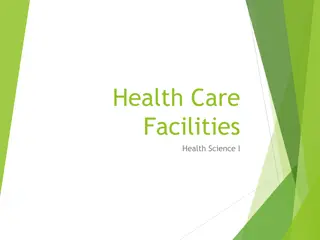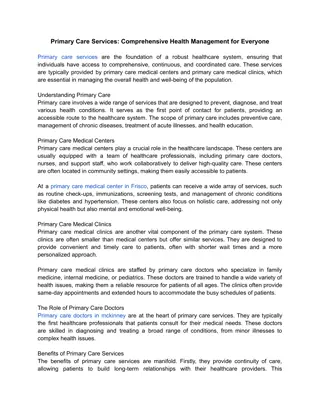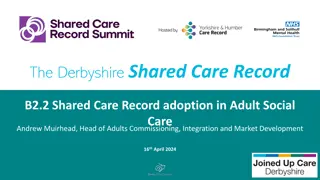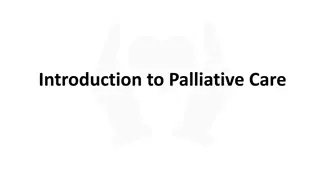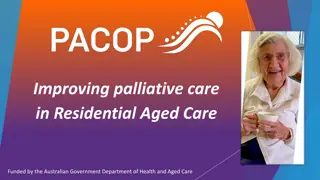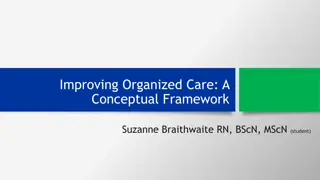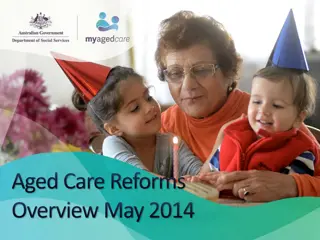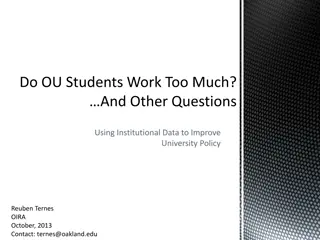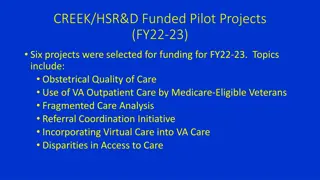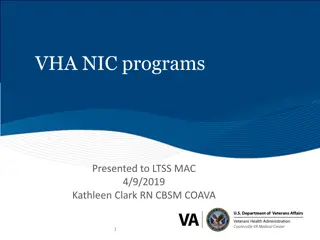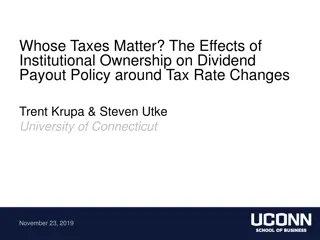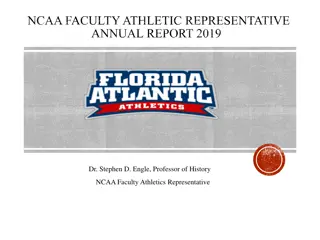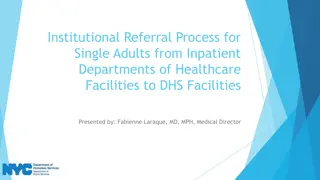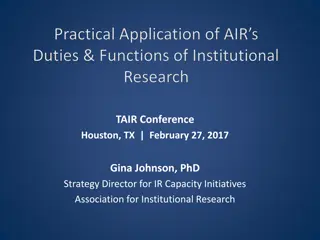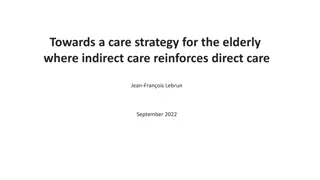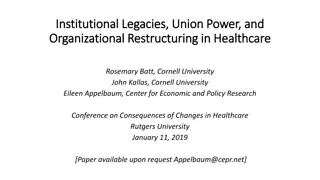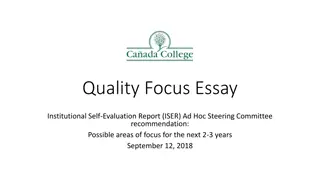INSTITUTIONAL GOVERNANCE FRAMEWORK
Currently, there is a lack of formal structure in the Institutional Housing Governance Framework (IHGF) within the public service system, leading to inefficiencies in managing institutional housing policies. This absence has resulted in deteriorating state assets, unmet housing demands, and ineffect
0 views • 17 slides
Integrating Behavioral Health in Primary Care: Collaborative Care Model (CoCM) Approach
Explore the Collaborative Care Model (CoCM) and Behavioral Health Integration in Primary Care discussed at the North Carolina Community Health Care Association Clinical Conference. Learn about key objectives, roles, billing codes, and resources to promote overall health and reduce treatment gaps and
2 views • 35 slides
Quick MD Care_ Your Trusted Partner in Primary Care Medicine
Quick MD Care: Your Trusted Partner in Primary Care Medicine\n\nWelcome to Quick MD Care, where compassionate primary care meets convenience. We understand the importance of having a trusted partner in managing your health. Our team of dedicated primary care doctors is committed to providing persona
5 views • 2 slides
Health Care Facilities
Explore a comprehensive guide to various health care facilities, including hospitals, long-term care facilities, medical offices, and clinics. Learn about the types of hospitals, such as general, specialty, government, and university hospitals. Discover the functions of long-term care facilities lik
0 views • 9 slides
Understanding Proportionate Care in Healthcare
Explore the concept of Proportionate Care, previously known as Single-Handed Care, which aims to increase capacity in the care market, reduce delayed transfers of care, and improve service user outcomes. Addressing common concerns and myths related to moving and handling tasks, this approach promote
0 views • 10 slides
Primary Care Services: Comprehensive Health Management for Everyone
Primary Care Services: Comprehensive Health Management for Everyone\n\nPrimary care services are the foundation of a robust healthcare system, ensuring that individuals have access to comprehensive, continuous, and coordinated care. These services are typically provided by primary care medical cente
2 views • 2 slides
Understanding The Differences Between Hourly Care and Live-In Care
Choosing the right type of Home Health Aide NJ for your loved one can be challenging. Whether you need occasional support or constant supervision, understanding the differences between hourly care and live-in care is crucial for making the best decision.\n\nFor more info visit: \/\/carebridge.care\/
1 views • 6 slides
The Derbyshire Shared Care Record: Integration in Adult Social Care
The Derbyshire Shared Care Record B2.2 adoption in Adult Social Care under the leadership of Andrew Muirhead is a significant initiative enhancing care quality and delivery. This project involves multiple agencies like Derby City Council, Derbyshire County Council, and healthcare trusts to integrate
0 views • 12 slides
Understanding Palliative Care: Enhancing Quality of Life in Serious Illness
Palliative care is a holistic approach focused on improving the quality of life for patients and their families dealing with life-threatening illnesses. It involves early identification, assessment, and treatment of pain and other physical, emotional, and spiritual issues. This comprehensive trainin
0 views • 60 slides
Child Care and Youth Programs at Minot AFB
Offering a range of child care services including Child Development Center for ages 6 weeks to 5 years, School Age Care for Kindergarten to 12 years, Family Child Care Program, and Youth Programs for ages 9-18. Services include full-time care, before/after school care, extended duty care, emergency
1 views • 6 slides
Enhancing Palliative Care in Australian Residential Aged Care
PACOP, funded by the Australian Government Department of Health and Aged Care, is a program focused on improving palliative care in residential aged care facilities. It involves standardized assessment practices, early identification of care needs, and a collaborative model for sustainable support.
0 views • 10 slides
Priorities and Quality Measures for Type 2 Diabetes Care in NHS GGC
Dr. Kashif Ali leads primary care for Type 2 diabetes, while Dr. James Boyle oversees secondary care in NHS GGC. The data from December 2018 shows the number of Type 2 diabetes patients, their care processes, HbA1c levels, and BMI status. The Diabetes Quality Improvement and Outcome Measures aim to
0 views • 27 slides
Maximizing Institutional Impact through ACE Centers of Excellence
ACE Impact Centers of Excellence benefit from strong institutional support and are crucial for catalyzing broader teaching and research excellence. The DLI.7 framework outlines various elements that support global best practices in Higher Education, emphasizing the importance of institutional owners
0 views • 17 slides
Child Care Challenges in Kentucky: The Child Care Cliff
Explore the landscape of child care in Kentucky, revealing the challenges families face with the Child Care Cliff. Discover statistics on child care centers, family child care homes, and the average cost of child care in Kentucky. Understand the importance of the Child Care Assistance Program (CCAP)
0 views • 18 slides
Exploring Civic Virtue and Institutional Design in Early Modern Governance
Delve into the complexities of civic virtue and institutional design in early modern governance through a 3,000-word essay. Analyze the necessity of civic virtue within the state and consider contrasting perspectives on whether institutional design can replace it. Use primary texts to support your a
0 views • 32 slides
Impact of UN Guidelines on Foster Care and Institutional Care of Young Children in Europe and Central Asia
Professor Kevin Browne and Dr. Shihning Chou conducted a study on the impact of UN guidelines on foster care and institutional care of young children in Europe and Central Asia. The research highlights the physical harm and neural damage caused to children in institutional care without a parent. It
0 views • 11 slides
Understanding Organized Care in Primary Care Settings
Organized Care refers to a natural community of caregivers with a shared commitment to proactive population and individual care management. Through effective and efficient practices, it serves the needs of patients across various settings and over time, with aligned goals and provider accountability
0 views • 18 slides
Strengthening Legal and Institutional Frameworks for REDD+ in Republic of Congo
The Ministry of Forest Economics in the Republic of Congo, along with the National REDD Coordination, is actively identifying, evaluating, and strengthening the legal and institutional frameworks for the REDD+ process. Progress reports highlight the establishment of institutional arrangements, imple
0 views • 10 slides
Institutional Assessment & Research at Wentworth Institute of Technology
Wentworth Institute of Technology excels in accreditation, institutional assessment, and research. The institution's leadership program oversees accreditation efforts to ensure educational effectiveness. They focus on assessing student learning outcomes, measuring educational effectiveness, and cond
0 views • 5 slides
Institutional Assessment and Effectiveness Workshop Achievements at SUNY Oneonta
The Office of Institutional Assessment and Effectiveness at SUNY Oneonta has made significant progress in developing assessment protocols and processes, leading to a culture of assessment. This includes completing planning and assessment cycles, establishing objectives and procedures, and aligning u
1 views • 16 slides
Learnings and Challenges from the Royal Commission by Commissioner Robert Fitzgerald AM
Commissioner Robert Fitzgerald AM shares insights from the Royal Commission on addressing child abuse in various institutional contexts, highlighting the importance of listening to survivors, reflecting on past failures, and empowering victims to create safer environments for children. The Commissio
0 views • 44 slides
Overview of Aged Care Reforms in May 2014
Aged Care Reforms in May 2014 introduced significant changes to the aged care sector in Australia. The reforms aimed at providing quality care for older Australians, reducing red tape, and enhancing services such as Home Care Packages, MyAgedCare, and the Australian Aged Care Quality Agency. Changes
0 views • 45 slides
Minot Air Force Base Family Child Care Programs
Offering a variety of child care services including Child Development Center (CDC) for infants to 5 years old, School Age Care (SAC) for Kindergarten to 12 years, Youth Programs for ages 9-18, and Family Child Care Program (FCC) for infants to 12 years. Additional programs include Extended Duty Care
0 views • 6 slides
Understanding Institutional Advancement and Foundation Grants at UAMS
Institutional Advancement (IA) at UAMS is the fundraising unit that collaborates with various stakeholders to secure funds for the institution's philanthropic priorities. IA engages individuals, families, nonprofits, corporations, and foundations for gifts and grants of $25,000 or more. Their missio
1 views • 14 slides
Impacts of Marketisation on Home Care for Older People in Urban China
This study by Wenjing Zhang from the University of Bristol delves into the effects of the marketisation process on home care for the elderly in urban China. It explores the rationale behind the marketisation of care, the trends in home care marketisation, and the processes involved. The background s
0 views • 19 slides
Inter-institutional Program for Youth Development and Peace Promotion
The National Police's Inter-institutional Program focuses on adolescent and youth development for a culture of peace. Various government institutions collaborate to implement the program, offering social care, promoting youth culture, entrepreneurship, and community-police relations. Over the evalua
0 views • 14 slides
Utilizing Institutional Data to Enhance University Policy: Insights from Oakland University Research
Extracting valuable insights from institutional data, the Office of Institutional Research and Assessment at Oakland University conducts various research activities to improve university policy. Through surveys and internal research, they address important questions like student workload, financial
0 views • 18 slides
Institutional Effectiveness and Assessment at B-CU
Jennifer Dash, Director of Institutional Assessment, and Dorian Hooks, Institutional Assessment Coordinator at B-CU, lead the efforts in understanding institutional effectiveness and assessment. Capacity building, creating a common vision, and a framework for institutional effectiveness are highligh
0 views • 35 slides
VA Healthcare Pilot Projects FY22-23
Six VA-funded pilot projects for FY22-23 focus on improving obstetrical quality of care, outpatient care utilization by Medicare-eligible veterans, fragmented care analysis, referral coordination, virtual care integration, and addressing disparities in access to care. Projects include assessing obst
0 views • 7 slides
VA Long-Term Services and Supports Programs Overview
This content provides detailed information on VA Long-Term Services and Supports programs, including Veteran eligibility criteria, non-institutional care programs like Adult Day Health Care and Respite Services, and services like Homemaker/Home Health Aide and Skilled Home Care. The description outl
0 views • 17 slides
Effects of Institutional Ownership on Dividend Payout Policy
This study examines how a firm's ownership structure, particularly institutional ownership, influences its dividend policy around tax rate changes. It explores the impact of tax-sensitive/insensitive institutional ownership, the role of dedicated institutions as monitors, and the interaction between
1 views • 26 slides
NCAA Faculty Athletics Representative Annual Report 2019
Dr. Stephen D. Engle, a Professor of History, serves as the NCAA Faculty Athletics Representative (FAR) and Chair of the Inter-Collegiate Athletic Committee. The report outlines the general responsibilities of the FAR, including overseeing sub-committees on Academic Performance, Institutional Contro
1 views • 13 slides
Institutional Referral Process for Single Adults from Inpatient Departments to DHS Facilities
This presentation outlines the institutional referral process for single adults from inpatient departments of healthcare facilities to DHS facilities, focusing on screening referrals, coordinating care for medically appropriate individuals, and improving health outcomes. It covers goals, the shelter
0 views • 51 slides
Role and Functions of Institutional Research in Higher Education
This content discusses the importance of developing duties and functions for Institutional Research (IR) professionals in higher education institutions. It highlights the key responsibilities of IR, such as identifying information needs, collecting and analyzing data, serving as data stewards, and e
0 views • 21 slides
Enhancing Elderly Care: Direct and Indirect Support Strategies
Implementing a care strategy for the elderly involves integrating both direct, personal care activities and indirect care tasks. This approach benefits two key target audiences, including millions with varying levels of dependency and informal carers. The positive impacts of indirect care include we
0 views • 7 slides
Opportunities to Mobilize Institutional Investment in Capital Markets
Aligning trillions of dollars managed by OECD institutional investors towards green infrastructure investments presents a significant opportunity. Currently, only a small percentage of large pension fund assets are directed towards infrastructure, with an even smaller fraction allocated to green pro
0 views • 4 slides
Understanding Subacute Care: Types of Residents and Care Settings
Subacute care involves providing specialized care for individuals who require more attention than what typical long-term care facilities can offer. This level of care is provided in settings like hospitals or certain units within long-term care facilities. Residents in subacute care settings need a
0 views • 62 slides
Enhancing Student Retention Rates through Institutional Data Analysis
Explore how Oakland University's Office of Institutional Research and Assessment leverages various data sources, policy analysis, and predictive modeling to improve student success and retention. Discover the role of IR offices, available resources, survey data, and the importance of collaboration f
0 views • 33 slides
Examining Union Power and Institutional Legacies in Healthcare Organizational Restructuring
Challenges faced by healthcare unions due to institutional legacies and shifts in the healthcare system are explored. The study delves into the variation in union success, emphasizing local institutional contexts in the U.S. and power dynamics between employers and unions rooted in historical contin
0 views • 16 slides
Institutional Self-Evaluation Report: Quality Focus Areas for Future Growth
The Institutional Self-Evaluation Report recommends key focus areas for the next 2-3 years to enhance student learning and achievement. Projects include addressing barriers to entry, streamlining processes, enhancing student support programs, and improving institutional effectiveness through plannin
0 views • 5 slides



